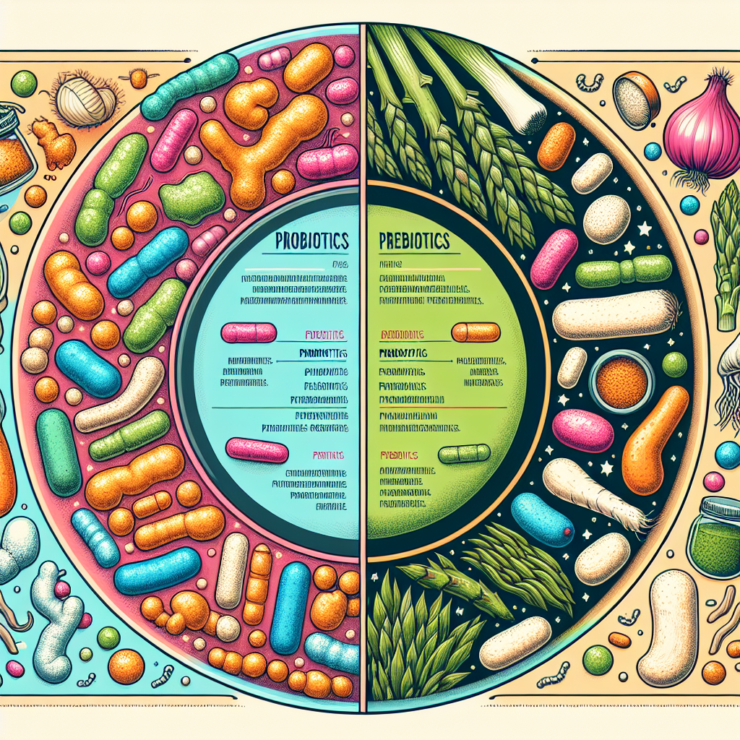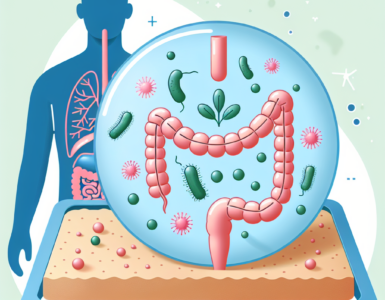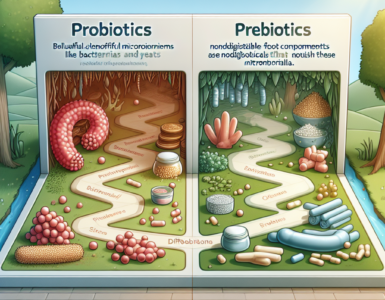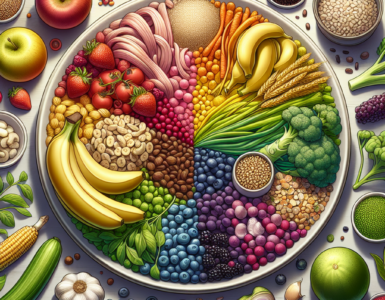The Basics of Gut Health
Understanding the complexities of gut health is essential for maintaining overall wellness. This section delves into the foundational elements of the gut microbiome and its significance in the human body.
Understanding the Gut Microbiome
The gut microbiome refers to the trillions of microorganisms, including bacteria, viruses, fungi, and protozoa, that reside in the gastrointestinal tract. These microorganisms play a pivotal role in digestion, nutrient absorption, and immune system function.
| Microorganism Type | Approximate Number in Gut |
|---|---|
| Bacteria | 100 trillion |
| Viruses | 100 billion |
| Fungi | 1000 species |
| Protozoa | Variable |
The diversity and balance of these microorganisms are critical for gut health. A healthy gut microbiome is characterized by a wide variety of species and a balance between beneficial and potentially harmful organisms.
Importance of Gut Health in Overall Wellness
Gut health is intrinsically linked to overall health and wellness. It influences numerous bodily functions, including:
- Digestion and Nutrient Absorption: A well-functioning gut microbiome helps break down food, allowing for the absorption of essential nutrients.
- Immune System: A significant portion of the immune system is located in the gut, and the microbiome interacts with immune cells, influencing the body’s immune response.
- Mental Health: Emerging research suggests a connection between gut health and mental health, often referred to as the gut-brain axis.
| Body Function | Impact of Gut Health |
|---|---|
| Digestion | Aids in the breakdown and absorption of nutrients |
| Immunity | Regulates immune responses, protecting against pathogens |
| Mental Health | Communicates with the brain, potentially affecting mood and behavior |
Maintaining a balanced gut microbiome is therefore crucial for digestive health, immunity, and potentially mental well-being. Diet and lifestyle choices can significantly influence the composition and health of the gut microbiome, making the understanding of probiotics and prebiotics vital components for anyone who wishes to optimize their overall health.
Probiotics and Prebiotics Defined
Understanding the distinction between probiotics and prebiotics is essential for individuals looking to enhance their gut health and overall wellness. These two components work synergistically within the digestive system but have different roles and functions.
What Are Probiotics?
Probiotics are live microorganisms, often referred to as “good” or “beneficial” bacteria, that contribute to the health of the gut microbiome when consumed in adequate amounts. These bacteria reside in various parts of the digestive tract and are integral to many bodily functions, including digestion, nutrient absorption, and immune response.
The primary benefit of probiotics is their ability to maintain or restore the natural balance of the gut microbiota. This balance can be disrupted by factors such as antibiotics, poor diet, and stress.
| Benefits of Probiotics | Examples |
|---|---|
| Improve digestive health | Lactobacillus, Bifidobacterium |
| Enhance immune function | Saccharomyces boulardii |
| Reduce inflammation | Various strains of Lactobacillus and Bifidobacterium |
What Are Prebiotics?
Prebiotics, on the other hand, are non-digestible fibers found in various foods that act as food for probiotics. By consuming prebiotics, individuals can stimulate the growth and activity of beneficial bacteria in the gut. These fibers pass through the upper part of the gastrointestinal tract and are fermented by the gut microflora in the colon, leading to the production of short-chain fatty acids, which have been shown to benefit colon health and reduce the risk of certain diseases.
| Benefits of Prebiotics | Examples |
|---|---|
| Support growth of beneficial bacteria | Inulin, Fructooligosaccharides (FOS) |
| Enhance calcium absorption | Galactooligosaccharides (GOS) |
| Promote bowel regularity | Resistant starch |
By defining both probiotics and prebiotics, one can appreciate their individual contributions to gut health and understand how their combined effects are instrumental in maintaining a healthy and balanced digestive system.
Probiotics: The Beneficial Bacteria
Within the domain of gut health, probiotics have garnered significant attention. These beneficial bacteria play a pivotal role in maintaining a balanced gut microbiome, thus influencing overall wellness.
How Probiotics Contribute to Gut Health
Probiotics are live microorganisms that, when administered in adequate amounts, confer a health benefit on the host. They contribute to gut health by:
- Restoring the natural balance of the gut microbiota, especially after it has been disrupted by factors like antibiotics or a poor diet.
- Competing with harmful bacteria for space and nutrients, reducing the risk of unwanted bacteria overgrowth.
- Enhancing the integrity of the gut lining, which can prevent harmful substances from “leaking” into the bloodstream.
- Modulating the immune system, ensuring that it responds adequately to threats without overreacting, as it might in autoimmune conditions or allergies.
Sources of Probiotics
Probiotics can be found naturally in a variety of fermented foods or can be consumed in the form of dietary supplements. Below is a list of common food sources rich in probiotics:
| Food Source | Probiotic Content |
|---|---|
| Yogurt | Live cultures such as Lactobacillus and Bifidobacteria |
| Kefir | A broader range of bacteria and yeasts |
| Sauerkraut | Lactic acid bacteria |
| Kimchi | Lactic acid bacteria and other beneficial microbes |
| Miso | Aspergillus oryzae |
| Kombucha | A symbiotic colony of bacteria and yeast (SCOBY) |
It’s important to note that not all fermented foods contain live probiotics, as some processing methods can destroy these sensitive microorganisms. For those considering a supplement, it is crucial to look for products that specify the live bacterial count at the time of consumption.
By understanding the fundamental roles of probiotics and integrating rich sources into one’s diet, an individual can effectively support their gut health and contribute to their overall well-being.
Prebiotics: The Fuel for Healthy Bacteria
As discussions around gut health become increasingly prevalent, the distinction between probiotics and prebiotics becomes more significant. Prebiotics are often overshadowed by their more famous counterparts, the probiotics, yet they play an essential role in maintaining a balanced gut microbiome.
How Prebiotics Support Probiotic Growth
Prebiotics are non-digestible fibers that serve as a food source for the beneficial bacteria in the gut. These fibers pass through the upper part of the gastrointestinal tract undigested and stimulate the growth and activity of advantageous microorganisms that colonize the large bowel. By doing so, they contribute to the health of the host by improving the balance and activity of the gut microbiome.
The fermentation of prebiotics by gut bacteria produces short-chain fatty acids (SCFAs), which are critical for colon health. SCFAs serve as an energy source for colon cells, reduce inflammation, and help regulate electrolyte levels in the body. This process underscores the symbiotic relationship between prebiotics and probiotics, where prebiotics nourish the probiotics, thereby enhancing their efficacy and fostering a healthier gut environment.
Sources of Prebiotics
Prebiotics are found naturally in many foods, particularly those high in dietary fibers. Common sources include fruits, vegetables, and whole grains. Here is a list of foods that are known for their prebiotic content:
- Chicory Root
- Jerusalem Artichoke
- Garlic
- Onions
- Leeks
- Asparagus
- Bananas
- Barley
- Oats
- Apples
- Flaxseeds
- Seaweed
To illustrate the prebiotic content in some of these foods, consider the following table:
| Food Source | Prebiotic Fiber Content (per 100g) |
|---|---|
| Chicory Root | 41.6g |
| Jerusalem Artichoke | 31.5g |
| Garlic | 17.5g |
| Onion | 1.5g |
| Asparagus | 2.5g |
| Banana | 1.0g |
| Barley | 17.3g |
| Oats | 5.0g |
Incorporating a variety of these foods into your diet can ensure that you are providing ample fuel for the probiotics in your gut. It is also worth noting that some prebiotic fibers are found in lesser-known sources like under-ripe bananas, which have a higher resistant starch content.
In conclusion, prebiotics are an indispensable element in gut health, given their ability to support and enhance the growth of beneficial bacteria. By understanding the sources and functions of prebiotics, individuals can make informed dietary choices that contribute to their overall wellness.
Probiotics vs Prebiotics
When discussing gut health, probiotics and prebiotics are often mentioned in the same breath. While they are both essential for maintaining a healthy digestive system, they serve distinct roles.
Key Differences
The primary distinction between probiotics and prebiotics lies in their functions and composition. Probiotics are live microorganisms that add to the population of good bacteria in your gut. Prebiotics, on the other hand, are non-digestible fibers that serve as food for these beneficial bacteria.
| Aspect | Probiotics | Prebiotics |
|---|---|---|
| Definition | Live beneficial bacteria | Non-digestible fibers |
| Function | Improve gut flora balance | Fuel for probiotics |
| Benefits | Support immune system, improve digestion, and reduce inflammation | Enhance growth of beneficial bacteria, improve calcium absorption, and may aid in weight management |
| Examples | Yogurt, sauerkraut, and other fermented foods | Bananas, onions, garlic, and chicory root |
Understanding these differences is crucial for anyone looking to optimize their gut health. While probiotics contribute directly to the microbiome, prebiotics provide the necessary resources for probiotics to thrive.
How They Work Together for Gut Health
The symbiotic relationship between probiotics and prebiotics is key to a healthy gut. Probiotics rely on prebiotics as their food source, which allows them to multiply and maintain a balanced gut microbiome. This balance is vital for digestive health, immune function, and even mental well-being.
To illustrate the cooperative function of probiotics and prebiotics, consider the following analogy: probiotics are like seeds of beneficial bacteria, while prebiotics are the soil and fertilizer that allow these seeds to grow and flourish. A diet lacking in either component can hinder the growth of healthy gut bacteria, potentially disrupting the gut ecosystem.
In summary, probiotics introduce beneficial bacteria to the gut, while prebiotics ensure that these bacteria have the nutrients they need to survive and perform their health-promoting functions. By incorporating both into one’s diet, individuals can support their gut health and, consequently, their overall wellness.
Incorporating Probiotics and Prebiotics into Your Diet
To maintain a healthy gut microbiome, it is essential to include both probiotics and prebiotics in one’s diet. Understanding how these two key components work together can significantly enhance gut health.
Dietary Considerations for Optimal Gut Health
When planning a diet for optimal gut health, it is crucial to focus on diversity and balance. A varied diet rich in fruits, vegetables, whole grains, and fermented foods can provide a wide range of probiotics and prebiotics necessary for maintaining a balanced gut microbiome.
| Nutrient | Food Sources |
|---|---|
| Probiotics | Yogurt, Kefir, Sauerkraut, Kimchi, Miso, Tempeh |
| Prebiotics | Garlic, Onions, Leeks, Asparagus, Bananas, Whole Grains |
It’s important to consume these foods regularly to support the growth of beneficial bacteria. Additionally, staying hydrated and limiting the intake of processed foods, artificial sweeteners, and other potential disruptors of gut health are vital dietary considerations.
Balancing Probiotics and Prebiotics
Balancing the intake of probiotics and prebiotics is key to promoting gut health. Probiotics introduce beneficial bacteria into the gut, while prebiotics serve as food to help these bacteria thrive. To establish this balance, individuals should aim to consume both types of nutrients daily.
Here are some practical tips for incorporating probiotics and prebiotics into your daily diet:
- Start the day with a probiotic-rich breakfast, such as yogurt or kefir, paired with high-fiber fruits that serve as prebiotics.
- Include a variety of whole grains in your meals, such as barley or oats, to increase your prebiotic intake.
- Add fermented foods like sauerkraut or kimchi to your meals to boost your probiotic consumption.
- Snack on prebiotic-rich foods such as bananas or garlic-based hummus.
By ensuring a daily intake of both probiotics and prebiotics, individuals can create a supportive environment for gut health. Remember, while supplements can be beneficial, obtaining these nutrients from whole food sources is generally recommended for overall nutritional balance.
Common Misconceptions About Probiotics and Prebiotics
The conversation around gut health often includes various claims and beliefs about probiotics and prebiotics. It’s crucial to distinguish fact from fiction to make informed decisions about dietary choices and gut health.
Debunking Myths
Several myths surround the use and effectiveness of probiotics and prebiotics. Here are a few common ones, clarified:
Myth: More probiotics mean better gut health.
Fact: Balance, rather than quantity, is key in gut health. An excessive amount of probiotics is not necessarily beneficial and may even cause discomfort.Myth: All probiotics are the same.
Fact: Probiotics come in various strains, each with unique benefits. It’s important to understand which strains are beneficial for specific health concerns.Myth: Probiotics can replace a healthy diet.
Fact: Probiotics supplement, rather than replace, a diet rich in fiber and diverse nutrients necessary for a healthy gut microbiome.Myth: Prebiotics have no side effects.
Fact: While generally beneficial, prebiotics can cause bloating or gas in some individuals, especially when introduced suddenly in large amounts.Myth: Probiotics are only found in supplements.
Fact: Probiotics are naturally present in many fermented foods, such as yogurt, kefir, and sauerkraut.
Understanding Labels and Claims
When it comes to purchasing products that contain probiotics or prebiotics, labels and marketing claims can sometimes be misleading. Here’s what to look for to ensure you’re making informed choices:
- CFU Count: This stands for Colony Forming Units and indicates the number of viable bacteria in a probiotic product. However, a higher CFU count does not automatically equate to a better product.
| Product Type | CFU Range |
|---|---|
| Probiotic Supplements | 1 billion – 100 billion |
| Fermented Foods | Varies widely |
Strain Specificity: Look for labels that list the specific strains of probiotics, as this can determine the health benefits you can expect.
Prebiotic Content: Some products may claim to contain prebiotics but only include them in negligible amounts. Check the ingredients list for sources of prebiotics like inulin, fructooligosaccharides (FOS), or galactooligosaccharides (GOS).
Expiration Date: Probiotics are living organisms and can lose potency over time. Ensure the product has a “use by” or expiration date.
Storage Requirements: Some probiotic supplements need to be refrigerated to maintain their effectiveness, while others are shelf-stable.
By understanding these labels and claims, individuals can better navigate the array of products available and choose those that are most likely to contribute positively to gut health. It’s always advisable to consult with a healthcare provider when making significant changes to one’s diet or introducing supplements, especially for those with underlying health conditions.
The Future of Gut Health Research
The field of gut health is rapidly evolving, with new discoveries and advancements that promise to deepen our understanding of how probiotics and prebiotics affect overall wellness. This burgeoning area of research holds the potential to revolutionize the way individuals manage their health through nutrition.
Current Trends in Probiotic and Prebiotic Research
In probiotic and prebiotic research, scientists are currently focusing on personalized gut health. Advances in genomics and biotechnology have led to the development of more specialized probiotic strains tailored to individual health needs. The trend is moving towards the customization of probiotic formulations to address specific health concerns such as irritable bowel syndrome, obesity, and even mental health issues like anxiety and depression.
Another area of interest is the synergy between probiotics and prebiotics, often referred to as synbiotics. Research is delving into how these combinations work more effectively together than either component alone. Studies are exploring the optimal ratios and pairings of probiotics and prebiotics for enhancing gut microbiota balance and function.
| Research Area | Description |
|---|---|
| Personalized Probiotics | Developing probiotic strains tailored to individual health profiles. |
| Synbiotics | Investigating the combined effects of probiotics and prebiotics. |
Potential Developments in Gut Health Solutions
Looking ahead, it’s anticipated that advancements in gut health research will lead to innovative solutions for managing and preventing disease. One exciting prospect is the use of probiotics as preventative therapies. By understanding the role of specific bacterial strains in disease mechanisms, researchers aim to create probiotic solutions that could potentially prevent conditions before they arise.
Another development on the horizon is the use of artificial intelligence (AI) and machine learning in predicting and analyzing gut health outcomes. AI can process vast amounts of data from studies on gut microbiota to identify patterns and predict how individuals might respond to certain probiotic or prebiotic interventions.
The future of gut health research may also see the rise of non-invasive diagnostic tools for monitoring the gut microbiome. These tools would allow for real-time tracking of gut bacteria composition and function, providing valuable insights into the efficacy of probiotic and prebiotic treatments.
As research continues to unfold, the complexities of the gut microbiome and its impact on overall health become clearer, paving the way for targeted and effective gut health solutions that were once thought to be part of a distant future.
Disclaimer: This content is intended for informational purposes only and does not constitute medical advice, diagnosis, or treatment. While diet plays a significant role in supporting gut health, individual needs may vary. Always consult with a healthcare professional or a registered dietitian before making any changes to your diet, especially if you have existing health conditions or concerns. Use of this information is at your own risk.











